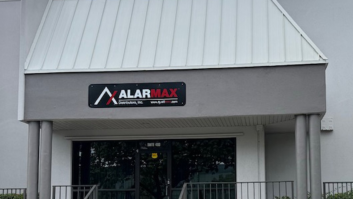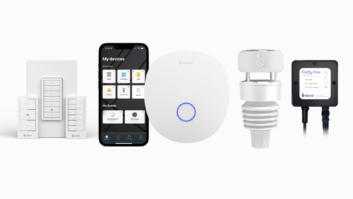RetailVision was once again dominated by software and accessory vendors, a healthy influx of companies displaying storage, home theater and playback devices were on hand for the first time.
Belkin, best known for its computer accessory products, was on hand to tout its hardware products, including its 802.11b networking products and cable/DSL routers. Jeff McCullough, a Belkin account manager, said the company is now gearing up to introduce the next level of wireless home networking with kits based on the 802.11a specification expected out early next year. Despite the fact the new specification is not backward-compatible with the products now being sold, McCullough was confident consumers would quickly adopt the new models because they will have a much transfer rate.
Loudspeaker maker Harman Multimedia displayed two multimedia speaker sets, the new Champaign model that will ship in the fourth quarter and the Sound Sticks that are now in stores. The Champaign model is a 40-watt, three-piece system with a brown wooden finish. The left and right speakers, which are shaped like champagne glasses, will carry a $169 suggested retail price. The Sound Sticks’ most striking feature is the clear plastic case and narrow satellites that have four small drivers piled on top of each other. Forest Clark, Harman’s program manager, said the Sound Sticks were designed with help from Apple Computer.
Software maker eMedia showed Guitar 2, a dual platform title for Macs and Windows PCs.
DFT, a consortium of Taiwanese manufacturers that has licensed the Polaroid brand name, had on hand a line of CD-R/RW drives, media and flash memory cards. Damon Martin, DFT vice president of business development, said DFT makes all the products itself and is marketing them under the Polaroid name to garner the recognition attached to that moniker. The drives are ready for retail, but the company has not inked any deals to place them on store shelves. The media and flash cards are available in a few regional chains, Martin said.
Alera Technologies had a slew of hardware, media and accessories at RetailVision. Perry Solomon, Alera’s CEO, was touting the CD Copy Cruiser Plus, a standalone device that Solomon described as a digital copying press for CDs. The Copy Cruiser has one 16X write CD-R/RW drive and a CD-ROM drive and has a $399 suggested retail price with a $50 mail-in rebate. The device has found a small niche as an industrial tool, but will be positioned as a consumer product, Solomon said.
Alera has also developed a professional version, the CD Copy Cruiser Pro 20 that has a 20x CD-RW drive that can burn a 650MB CD in about 3.5 minutes. Unlike the Plus, this version is intended for use with a PC and sports an IEEE 1394 connection. The projected suggested retail price will be between $450 and $499 and should be on stores shelves by mid October, Solomon said.
Solomon said Alera is working on a DVD-RW, which will probably be followed by a +RW version at a later date.
The blank media at the show included 650MB CD-R MP3 discs and 80mm CD-Rs, for use with Sony’s CD-R based Mavica digital cameras, that Alera is calling CD-R film.
Tripp Lite exhibited a mini-USB hub for notebook computers coming out this fall with a $39 suggested retail price and new UPS models with suggested prices between $49 and $99. The company also had on hand the recently revamped packaging for its surge protector line. The old cardboard boxes have been discontinued and replaced with clear clamshell packs.
Optical drive maker MicroSolutions was on hand with several products in its BackPack series, but Kristin Hanson, the firm’s Canadian sales manager, said the line will soon receive upgraded products that use USB 2.0. This upgrade to the now ubiquitous connection port will offer faster data transfer speeds.
The first of these devices will hit stores in limited numbers late November or early December, but Hanson did not expect sales to take off until 2002. For many months after the 2.0 models are out they will come equipped with a PCI card adapter that end users will have to install in their PC. After that time 2.0 ports will become standard on PCs, said Hanson.
Handheld scanner maker C-Pen showed the third generation of the pen-shaped scanner, which started shipping in June. The company reported OCR technology used in this model is much improved over that used in the first products. Future versions of the C-Pen could have on-board medical and law dictionaries and the ability to scan in spreadsheets. These communities are the primary purchasers of the C-Pen.
IBM’s Via Voice speech recognition software was on display. The important developments with this title are the upcoming release of a version compatible with Mac OS X and its ability to work with Microsoft Works 2002.
Case Logic is taking advantage of the popularity of MP3 players with new cases in three sizes, which should be able to hold all models available at retail. Case Logic has expanded its portable CD player line with models featuring reflective safety material for joggers.
Loretta Richter, Case Logic’s sales manager, gave a preview of what the company will show at Winter CES next January saying four new PDA cases will be introduced at that time. These cases will utilize a new method of containing the PDAs. Richter said most cases require the placement of Velcro strips on the backside of the PDA, which many owners dislike doing. So the new models will use flexible plastic straps to secure the device.
Strategic Vista showed off several remote monitoring security systems and a video sender system that can wirelessly send TV signals from one TV set to another. Most of DFT’s monitoring products are designed for business security, but a new version now selling at BJ’s Wholesale is for home use. It uses the 2.4GHz spectrum and for $139 comes with one camera and small monitor, but has the capability of controlling up to four cameras, said Alan Bass, executive vice president of Strategic Vista. The company is selling the products under the Sylvania brand name, which it has licensed.
American Power Conversion, like many PC and peripheral companies, is tying its latest generation of surge protection products to the launch this fall of Microsoft’s Windows XP operating system. On the surface this might seem an odd connection for a surge device, said APC’s national channel manager Todd Ceperley, but there is a link. Windows XP requires a more robust PC to operate properly so APC has more powerful surge units. The packaging prominently states that the product is XP ready.
In another major move APC has entered the notebook computer replacement battery business. This new line now contains batteries for IBM and Compaq notebooks, but APC is looking to expand to other brands. This is especially crucial with Compaq’s acquisition by Hewlett-Packard.












